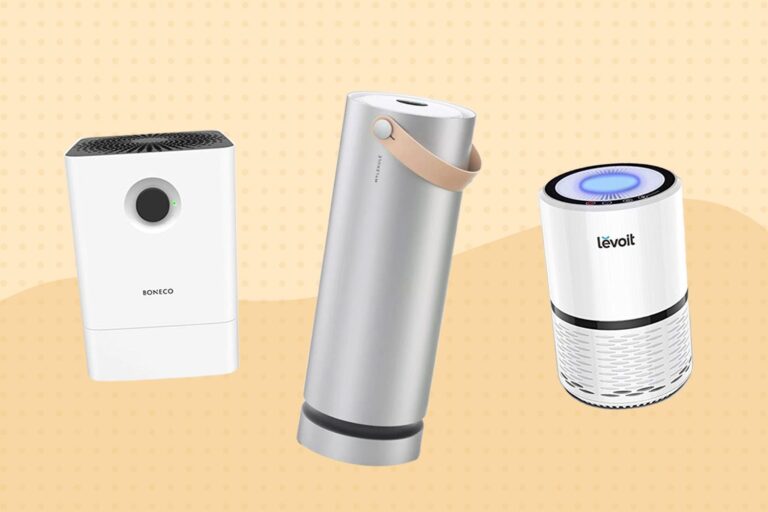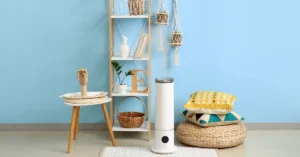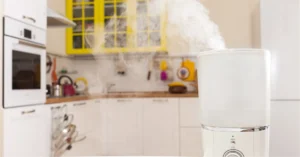Air purifiers can help alleviate sinus problems by removing allergens and irritants from the air, such as pollen, dust mites, and pet dander. When these particles are filtered out, it can reduce sinus inflammation and congestion, leading to improved respiratory health.
Sinus Problems And Air Purifiers: An Overview
When it comes to sinus problems, clean air plays a crucial role in maintaining sinus health. Sinus problems can be triggered by various allergens and irritants present in the air, such as dust, pollen, pet dander, and pollutants. Breathing in these particles can lead to congestion, inflammation, and sinus discomfort.
Air purifiers can help combat sinus problems by removing these allergens and irritants from the air, creating a cleaner and healthier environment. They use filters to capture and trap airborne particles, preventing them from circulating in the air and entering your nasal passages.
By using an air purifier, you can reduce your exposure to allergens and irritants, providing relief for your sinuses. However, it’s important to choose an air purifier with HEPA filters, as they are specifically designed to trap small particles such as pollen and dust mites.
Moreover, keeping your home clean and dust-free, regularly changing air filters, and maintaining a healthy level of humidity can also contribute to better sinus health.
:max_bytes(150000):strip_icc()/the-best-humidifiers-tested-and-reviewed-tout-5e4d78c9b59744518cecbd6b7834104c.jpg)
Credit: www.realsimple.com
Understanding Sinus Problems
Understanding sinus problems is crucial for finding effective solutions. Sinus problems are often caused by various factors such as allergies, infections, or structural issues in the sinuses. Allergies can trigger inflammation and congestion in the nasal passages, leading to sinus problems. Infections, such as the common cold or sinusitis, can cause swelling and blockage in the sinuses. Structural issues, like a deviated septum or nasal polyps, can also contribute to sinus issues.
The symptoms of sinus problems can vary, but some common signs include facial pain, pressure, congestion, and difficulty breathing through the nose. Sinus problems can also result in headaches, fatigue, and a reduced sense of smell.
These sinus-related symptoms can significantly impact daily life. They can affect sleep, concentration, and overall quality of life. Sinus problems can lead to decreased productivity, as individuals may struggle with focus and energy levels. Additionally, the discomfort and pain associated with sinus issues can limit physical activities and overall well-being.
The Ultimate Solution: Air Purifiers
The Ultimate Solution: Air Purifiers
Air purifiers can be a game-changer when it comes to improving air quality and providing relief for sinus problems. These devices work by filtering out pollutants such as dust, pet dander, pollen, and mold spores.
How air purifiers work to improve air quality:
- Filtration: Air purifiers use various types of filters, such as HEPA filters, to capture and eliminate airborne particles. These filters are designed to trap even the smallest pollutants, ensuring cleaner air.
- Activated carbon technology: Some air purifiers are equipped with activated carbon filters, which help remove odors and volatile organic compounds (VOCs) from the air.
- Ionization: Certain air purifiers release negative ions into the air, which can attach to positively charged particles such as dust and allergens, causing them to fall out of the air.
Benefits of using air purifiers for sinus problems:
- Reduced allergens: By removing allergens from the air, air purifiers can help alleviate symptoms, such as nasal congestion and sneezing.
- Cleaner air: Air purifiers improve indoor air quality, creating a healthier environment for individuals with sinus problems.
- Improved sleep: Breathing cleaner air can lead to better sleep quality, which is important for overall well-being.
Factors to consider when choosing an air purifier:
- Room size: Consider the square footage of the room where the air purifier will be used to ensure it is capable of effectively cleaning the air.
- Filter type: Research different filter types and choose one that is suitable for capturing the specific pollutants that trigger sinus problems.
- Add-ons: Some air purifiers come with additional features, such as a built-in air quality sensor or a UV-C light to kill bacteria and viruses.
- Noise level: If the air purifier will be used in a bedroom or office, consider the noise level to ensure it does not disturb your sleep or work.
Types Of Air Purifiers
HEPA filters: These filters are considered the gold standard for air purification. They are highly effective in removing tiny particles as small as 0.3 microns, including allergens, dust, and pollen.
Activated carbon filters: These filters excel at removing odors and chemical pollutants from the air. They work by adsorbing the odors and trapping the harmful chemicals, improving the overall air quality.
UV-C light purifiers: These air purifiers use ultraviolet (UV-C) light to eliminate germs, bacteria, and viruses. The UV-C light damages the DNA of these microorganisms, rendering them harmless and preventing the spread of infectious diseases.
Ionizers: Ionizers release negative ions into the air, which attach to positively charged particles like dust and allergens. This process makes the particles heavy and causes them to fall onto surfaces, reducing airborne pollutants and enhancing overall air quality.
Best Practices For Using Air Purifiers
Air purifiers offer a range of benefits for individuals suffering from sinus problems. To ensure maximum effectiveness, it is important to follow certain best practices. Firstly, proper placement and sizing of the air purifier are essential. Position the purifier in the room where you spend the most time, such as the bedroom or living room. Consider the size of the room and choose a purifier with the appropriate coverage area.
Maintenance and regular filter replacement are crucial for optimal performance. Clean the filters at least every three months, or as indicated by the manufacturer, and replace them whenever necessary. This helps to maintain the purifier’s efficiency and effectiveness in removing allergens and irritants from the air.
For individuals with allergies, certain considerations should be kept in mind. Look for air purifiers specifically designed for allergy sufferers, as these are equipped with features like HEPA filters and activated carbon filters, which trap allergens effectively. Ensure the purifier is certified by reputable organizations, such as the Asthma and Allergy Foundation of America, to provide added assurance of its allergy-fighting capabilities.
Additional Steps For Combating Sinus Problems
When dealing with sinus problems, air purifiers can be a helpful addition to your wellness routine. However, there are also other steps you can take to combat sinus problems and create a healthier indoor environment.
Keeping a clean and dust-free home environment is crucial for sinus sufferers. Regularly dusting surfaces, vacuuming with a HEPA filter, and washing bedding can help reduce allergens. Using allergen-proof covers for pillows and mattresses can also be beneficial.
Managing humidity levels is another important aspect. High humidity can promote the growth of mold and dust mites, worsening sinus symptoms. Using dehumidifiers in damp areas like the bathroom or basement can help control moisture levels and reduce the risk of sinus issues.
Ventilation and fresh air intake are also key. Opening windows and allowing fresh air to circulate can help remove indoor pollutants. Using exhaust fans in the kitchen and bathroom can further enhance air exchange and reduce the concentration of airborne particles.
Choosing The Right Air Purifier For Your Needs
When it comes to addressing sinus problems, air purifiers can be a helpful solution. Choosing the right air purifier for your needs involves considering the size of the room and the specific air quality requirements. You’ll want to take into account the square footage of the room to ensure that the air purifier is capable of effectively covering the space. Additionally, assessing the air quality needs is essential. Look for air purifiers with features such as HEPA filters, which can effectively remove allergens, dust, and other irritants from the air. Some purifiers also include activated carbon filters, capable of eliminating odors and chemicals.
Other specifications to look for include the Clean Air Delivery Rate (CADR), which indicates how efficiently the purifier can clean the air. Noise levels should also be considered, especially if the purifier will be placed in a bedroom or workspace. When it comes to recommendations, highly rated air purifiers for sinus problems include the Rabbit Air MinusA2, Coway AP-1512HH Mighty, and Blueair Blue Pure 211+. These models offer effective filtration and customizable settings to cater to specific needs.
Frequently Asked Questions For Do Air Purifiers Help With Sinus Problems
Is An Air Purifier Or Humidifier Better For Sinuses?
An air purifier is better for sinuses as it helps remove allergens and irritants from the air, promoting better respiratory health. A humidifier adds moisture to the air, which can alleviate dryness but may not specifically target sinus issues.
Can Poor Air Quality Cause Sinus Issues?
Poor air quality can indeed cause sinus issues. Harmful particles and pollutants in the air can irritate the nasal passages, leading to inflammation and congestion. This can result in symptoms like sinus headaches, pain, and difficulty breathing. Ensuring clean and filtered air can help alleviate sinus problems.
Do Air Purifiers Help With Allergies And Congestion?
Yes, air purifiers can help with allergies and congestion by removing airborne allergens and irritants, such as pollen, dust, and pet dander, from the air. They create a cleaner environment, reducing symptoms and improving overall air quality.
What Are The Disadvantages Of Air Purifier?
Air purifiers may produce ozone, which can be harmful in high concentrations. They also require regular filter replacements, increasing maintenance costs. Some models can be noisy, disrupting peaceful environments. Additionally, air purifiers may not effectively remove certain pollutants like volatile organic compounds (VOCs) or mold.
Conclusion
Ultimately, air purifiers can be a helpful tool in alleviating sinus problems. By removing allergens and pollutants from the air, these devices create a cleaner and healthier indoor environment. This can significantly reduce the frequency and severity of sinus symptoms such as congestion, sneezing, and headaches.
Investing in a high-quality air purifier is a proactive step towards improving your overall well-being and managing your sinus issues effectively. Experience the benefits firsthand and breathe easier with the aid of an air purifier.




